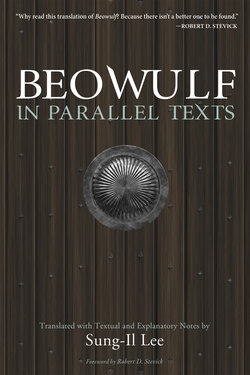Читать книгу Beowulf in Parallel Texts - Sung-Il Lee - Страница 7
На сайте Литреса книга снята с продажи.
Prefatory Note
ОглавлениеThis volume is meant to serve dual purposes: sharing with the general readers—who may not have been exposed to the old language in which Beowulf was composed—the pleasure I have had over the years while reading it, and providing the serious students of English language and literature with a translation for them to refer to while they tackle the Old English text.
My memory goes back to my youthful days when I struggled with Frederick Klaeber’s Beowulf text for the first time, verifying what I could gather from looking up word after word in his Glossary, by referring to E. Talbot Donaldson’s prose translation and Edwin Morgan’s verse translation. It was an excruciatingly arduous journey of groping over an apparently never-ending misty path. Yet each time I found what I had managed to construe with the help of Klaeber’s Glossary to concur with Donaldson’s translation or Morgan’s, the joy was compensation enough for my toil, which then seemed almost Sisyphean. I hope this volume will turn out, for the students of Old English, comparable to what the translations by Donaldson and Morgan were to me in my youthful days.
No less weighty is the sense of mission I feel toward myself as well as the students of Old English and the general readers. Providing a Modern English verse translation of Beowulf that can touch the heartstrings of the readers has ever been a dream of mine. Not for a vainglorious motive. English is an acquired language to me; and I have been a student of English language and literature all my life. Walking out onto the stage to show all I have come to claim as my own is a scary occasion that will tell whether my lifelong dedication has been a worthwhile one. If my lines can please the ears of the English-speaking people and receive an approving nod of the Beowulf-scholars, I shall be happy.
Any of the authoritative texts, edited by such scholars as Frederick Klaeber, Elliott Van Kirk Dobbie, and A. J. Wyatt (later revised by R. W. Chambers), can be chosen to be the anchor for translating the epic. But I did not stick to any of the three editions of the Beowulf text. Whenever I found any textual discrepancy between them, I turned to Julius Zupitza’s transliteration of the Cotton Vitellius Manuscript, in hopes of arriving at a reading that would strike the right note for me as a translator. I must confess that my reading of the original poem, insofar as the textual variants are concerned, has been eclectic.
This volume consists of what common sense asks for in preparing a book of this kind: an Introduction, in which I state what I had in mind in translating the first epic to appear in English literature, my Modern English verse rendition of the poem, and Textual and Explanatory Notes, which I hope will help the students of Old English as they read the work in its original text.
The sole extant manuscript of the poem bears Roman numerals indicating the allocation of fitts. Although Elliott Van Kirk Dobbie eliminated these Roman numerals in his edition, I restored them in the text of the original poem as well as in my translation.
Whenever I thought that the reader might need a note, I put an asterisk after a word, a phrase, or a passage in the original text and my translation, so that the reader may refer to the relevant entry in the Textual and Explanatory Notes with the line number or numbers preceding it. I decided to have all the notes put together after the poem—for fear that the sight of a note appearing at the bottom of each page might interrupt the reader’s enjoyment of the lines running in an epic sweep.
I am grateful to Professor Robert D. Stevick, a lifelong Beowulf-scholar, who read my translation carefully and decided to enrich this volume with his Foreword. I only fear that my work may not quite measure up to the commendatory words his Foreword contains. Grateful acknowledgment is due also to Professor Derek Pearsall, whose comments on particular lines and words in my translation have made me turn my eyes to several parts that needed stylistic improvement. I thank Dr. Robin Parry for reading my typescript carefully and providing a number of helpful suggestions in the final stage of editing. Finally, I wish to express my heartfelt gratitude to Professor J. Harold Ellens, who has given me strong support on the project and recommended this work to Wipf and Stock Publishers to let it have the honor of being on the list of the Cascade Books.
